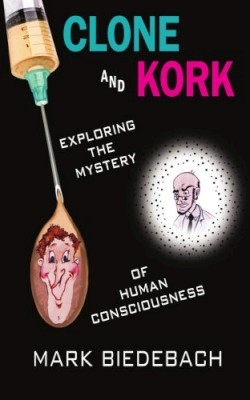Clone and Kork
Exploring the Mystery of Human Consciousness
Mark Biedebach’s “memoir-based fantasy” is two intriguing stories wrapped into one. In the telling one story is easier to follow but the other is more intellectually challenging. Both however are worthy: one for the autobiographical detail the retired university professor and researcher includes and the other for his imaginative approach in fantasizing about Biedebach’s inventions—Clone zipping through bloody veins and into people’s brains and Kork the ethereal messenger from “another parallel universe in hyperspace.” The mix of fact and fantasy is all for good reason of course namely to shed light on the aeons-old mystery of human consciousness.
Biedebach was about eight years old when he developed an initial interest in his own conscious existence. He wondered why he was aware of his “sensations feelings and thoughts” even asking himself “Why am I me? Why am I as a separate person so uniquely aware of my own existence?” These questions haunted him into his postgraduate studies in biophysics physiology and neuroscience and through his 34 years of teaching at California State University Long Beach. Eventually he invented the fantasy characters to help him and his readers find the answers.
The two figments of Biedebach’s fertile imagination gain lives of their own in his book. The miniscule Clone is a lab creation sent via hypodermic needle through the author’s veins and into the innermost recesses of his brain to talk realistically to animated cells about various operations there. Then Biedebach and Clone are off on other explorations—to a veterans’ hospital another to a hospital for brain damaged patients to discover how their consciousness was affected by war injuries or diseases such as epilepsy and Alzheimer’s. Kork on the other hand comes from beyond and uses telepathy to discuss and debate issues affecting the grand design and ultimate purpose of existence.
To help Biedebach understand Kork gets assistance from Spirit the Chief of the Department of Wave Function Management from Soul “the ghost of consciousness” even from the chief engineer and CEO of Hyperspace Management Headquarters who works “by Divine Providence” and confesses to being “the ultimate reality—the source of all true knowledge meaning and purpose.” Pretty heady stuff but it’s very well grounded in Biebebach’s fascinating story of his real life problems beginning with a divorce from a wife who felt his studies of consciousness left her out in the cold then to Russia where he fell deeply in love with Irina a divorcee with two teenaged children. Almost unbelievable episodes of bureaucratic immigration red tape ensue on the way out of Russia. One of the Irina’s children ends up sidetracked through Canada where she remains for two years as a student in Toronto prior to returning to Russia contracting TB and getting wrapped in more red tape before the intervention of a US Senator. Serious ill health dogged her again in the US as Biedebach describes so poignantly between his ongoing experiments with Clone and debates with Kork.
Biedebach’s imaginative attempts at finding the answers to his questions about human consciousness are laudable indeed perhaps even life-changing for some. But the memoirs of his untiring efforts to establish his family in the US are even more appealing.
Disclosure: This article is not an endorsement, but a review. The publisher of this book provided free copies of the book and paid a small fee to have their book reviewed by a professional reviewer. Foreword Reviews and Clarion Reviews make no guarantee that the publisher will receive a positive review. Foreword Magazine, Inc. is disclosing this in accordance with the Federal Trade Commission’s 16 CFR, Part 255.

